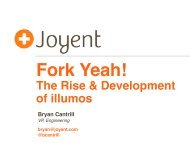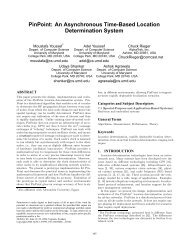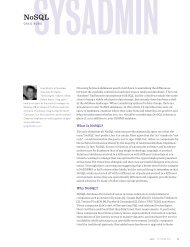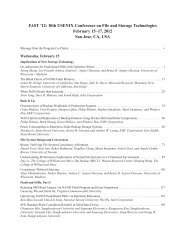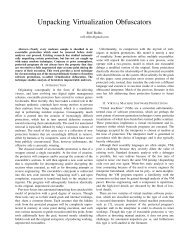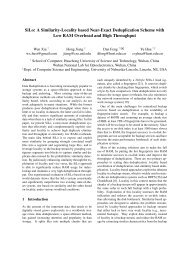2nd USENIX Conference on Web Application Development ...
2nd USENIX Conference on Web Application Development ...
2nd USENIX Conference on Web Application Development ...
You also want an ePaper? Increase the reach of your titles
YUMPU automatically turns print PDFs into web optimized ePapers that Google loves.
4.1 Developer Incentives<br />
Developer incentives can encourage or discourage permissi<strong>on</strong><br />
requests. Current incentives include the length<br />
of the review process, how the automatic update system<br />
treats additi<strong>on</strong>al permissi<strong>on</strong>s, and pressure from users.<br />
Review Process. Formal review can delay an applicati<strong>on</strong>’s<br />
entrance into the directory. Developers are often<br />
c<strong>on</strong>cerned about the length of the review process [13].<br />
If dangerous permissi<strong>on</strong>s increase the review time (and<br />
a lack of dangerous permissi<strong>on</strong>s decreases it), then developers<br />
have an incentive to use as few permissi<strong>on</strong>s as<br />
necessary. Google Chrome extensi<strong>on</strong>s have to undergo<br />
a review process if they include plug-ins, which incentivizes<br />
developers to not use plug-ins. Other platforms<br />
could adopt similar review systems or institute a timed<br />
delay for applicati<strong>on</strong>s with more permissi<strong>on</strong>s.<br />
Pressure From Users. The ultimate goal of a developer<br />
is to reach as many users as possible. If users are hesitant<br />
to install applicati<strong>on</strong>s with certain permissi<strong>on</strong>s, then developers<br />
are motivated to avoid those permissi<strong>on</strong>s. Users<br />
can express their dislike of permissi<strong>on</strong> requests in applicati<strong>on</strong><br />
comments and e-mails to the developer.<br />
We read the user comments for 50 randomly selected<br />
Google Chrome extensi<strong>on</strong>s with at least <strong>on</strong>e permissi<strong>on</strong>.<br />
Of the 50 extensi<strong>on</strong>s, 8 (15%) have at least <strong>on</strong>e comment<br />
questi<strong>on</strong>ing the extensi<strong>on</strong>’s use of permissi<strong>on</strong>s. The percentage<br />
of comments pertaining to permissi<strong>on</strong>s ranges<br />
widely, from 1 of 2 to 5 of 984. A majority of the permissi<strong>on</strong><br />
comments refer to the extensi<strong>on</strong>’s ability to access<br />
browsing history. Several commenters state that the<br />
permissi<strong>on</strong> requests are preventing them from installing<br />
an applicati<strong>on</strong>, e.g., “Really would like to give it a try. ...<br />
But why does it need access to my history? I hope you<br />
got a plausible answer because I really would like to try<br />
it out.” These comments indicate that a small number of<br />
users are pressuring developers to use fewer permissi<strong>on</strong>s.<br />
Additi<strong>on</strong>ally, developers of 3 of the 50 extensi<strong>on</strong>s descripti<strong>on</strong>s<br />
include an explanati<strong>on</strong> of their permissi<strong>on</strong> usage.<br />
This indicates that these developers are c<strong>on</strong>cerned<br />
about user reacti<strong>on</strong>s to permissi<strong>on</strong> requests.<br />
Automatic Updates. Android and Google Chrome automatically<br />
update applicati<strong>on</strong>s as they become available,<br />
according to user preferences. However, automatic updates<br />
do not proceed for applicati<strong>on</strong>s whose updates request<br />
more permissi<strong>on</strong>s. Instead, the user needs to manually<br />
install the update and approve the new permissi<strong>on</strong>s;<br />
in Android, this amounts to several additi<strong>on</strong>al screens.<br />
This incentivizes developers to request unnecessary permissi<strong>on</strong>s<br />
in in case later versi<strong>on</strong>s require the permissi<strong>on</strong>s.<br />
If update UIs were improved to minimize the user effort<br />
required to update applicati<strong>on</strong>s with new permissi<strong>on</strong>s,<br />
this disincentive might be eliminated.<br />
7<br />
4.2 Developer Error<br />
Developers may ask for unnecessary permissi<strong>on</strong>s due to<br />
c<strong>on</strong>fusi<strong>on</strong> or forgetfulness. We explore the prevalence of<br />
developer error. Tools that help developers select correct<br />
permissi<strong>on</strong>s could reduce applicati<strong>on</strong> privileges without<br />
requiring any changes to the permissi<strong>on</strong> system itself.<br />
4.2.1 Errors in Google Chrome Extensi<strong>on</strong>s<br />
Browser Managers. We count the extensi<strong>on</strong>s that request<br />
browser managers but do not use them. About<br />
half of the extensi<strong>on</strong>s in our set of 1000 “popular” extensi<strong>on</strong>s<br />
request access to security-relevant browser managers.<br />
We search their source code (including remotely<br />
sourced scripts) for references to their requested browser<br />
managers. 14.7% of the 1000 extensi<strong>on</strong>s are overprivileged<br />
by this measure because they request access to<br />
managers that they never use. It is possible for an extensi<strong>on</strong><br />
to name a browser manager without explicitly including<br />
the name as a string (e.g., "book"+"marks");<br />
we examined a random sample of 15 overprivileged extensi<strong>on</strong>s<br />
and found no evidence of developers doing this.<br />
Domains. We also review fifty randomly selected extensi<strong>on</strong>s<br />
for excessive domain access (see Appendix A). For<br />
each extensi<strong>on</strong>, we compare the permissi<strong>on</strong>s it requests<br />
with the domains needed to implement its functi<strong>on</strong>ality,<br />
which we determine by manually exercising the user interface<br />
and c<strong>on</strong>sulting its source code when necessary.<br />
We find that 41 of the 50 extensi<strong>on</strong>s request access to<br />
web data, and 7 of those are overprivileged: 5 request<br />
too many domain permissi<strong>on</strong>s for their core extensi<strong>on</strong>s,<br />
and 2 install c<strong>on</strong>tent scripts <strong>on</strong> unnecessary domains.<br />
The reas<strong>on</strong>s for overprivilege are diverse. One example<br />
is “PBTweet+”, which requests web access for a<br />
n<strong>on</strong>existent core extensi<strong>on</strong>; other examples are “iBood”<br />
and “Castle Age Autoplayer”, which request access to all<br />
domains even though they <strong>on</strong>ly interact with iBOOD and<br />
Facebook, respectively.<br />
“Send using Gmail (no butt<strong>on</strong>)” dem<strong>on</strong>strates a comm<strong>on</strong><br />
error, which is that developers sometimes request<br />
access to all and specific domains in the same list.<br />
We find that an additi<strong>on</strong>al 27 of the 1000 popularityranked<br />
extensi<strong>on</strong>s also make this mistake. This is a<br />
c<strong>on</strong>servative measure of wildcard-induced error; subdomain<br />
wildcards can feature the same mistake, like<br />
asking for both http://www.example.com and<br />
http://*.example.com.<br />
4.2.2 Errors in Android Applicati<strong>on</strong>s<br />
We manually review the top free and top paid applicati<strong>on</strong><br />
from eighteen Android Market categories (see Appendix<br />
A for a list). For each of the applicati<strong>on</strong>s, we compare<br />
<str<strong>on</strong>g>USENIX</str<strong>on</strong>g> Associati<strong>on</strong> <strong>Web</strong>Apps ’11: <str<strong>on</strong>g>2nd</str<strong>on</strong>g> <str<strong>on</strong>g>USENIX</str<strong>on</strong>g> <str<strong>on</strong>g>C<strong>on</strong>ference</str<strong>on</strong>g> <strong>on</strong> <strong>Web</strong> Applicati<strong>on</strong> <strong>Development</strong> 81



